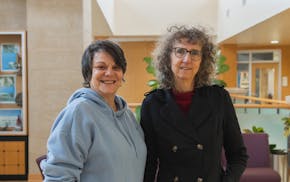Gliding across the ice, practicing his crossovers and three-turns, Jim Butwinick knows he'll never compete for Olympic gold.
But that's OK. He's 64 and took up figure skating in the hope of avoiding heart surgery.
Butwinick will be in the stands this weekend when hundreds of his peers, ranging in age from their 20s to early 80s, compete in the U.S. Adult Figure Skating Championships at the Bloomington Ice Garden. The competition began Wednesday and concludes Saturday with the highest-level champion master men's and women's events.
The skaters are part of what appears to be a trend among older Americans looking for something more vigorous than mall-walking to maintain their health. An AARP survey of people ages 50 to 79 found that 60 percent were physically active regularly and 41 percent said they participate in "vigorous activities" such as running or weight-lifting. At the Bloomington championships, there will be as many skaters in their 40s, 50s and 60s as there will be whippersnappers in their 20s and 30s, said Brenda Baga, chairwoman for the competition.
"You can skate at any age," said Butwinick, who took up the sport about five years ago after a doctor told him he might need heart bypass surgery.
The benefits of exercise for older people are well known, according to Don Denjel, an associate professor in the School of Kinesiology at the University of Minnesota. Exercise helps control blood pressure and blood-sugar levels and can slow the decline of muscle mass and bone density, Denjel said.
Dr. Christopher Williams, a Minneapolis pediatrician who will compete in three events this weekend, is a case in point. "It keeps me in shape," said Williams, 46. "One of my programs is three minutes and 10 seconds long, and I am moving the whole time. Even NHL players, if their shift is over a minute, get tired."
Higher-impact activities can produce better health results than low-impact activities such as walking or swimming -- but also have higher risks for older athletes, Denjel said.
"When you are older, the recovery time is longer," Denjel said, noting that gains from exercising erode faster than they accrue.
"It is always better for older people to underestimate their abilities," Denjel said.
Butwinick understands, but he is not deterred.
"The few times I have fallen, it wasn't too bad," Butwinick said. "They teach you how to fall. It's all part of the technique."
Megan Hanson is a University of Minnesota student on assignment for the Star Tribune.
